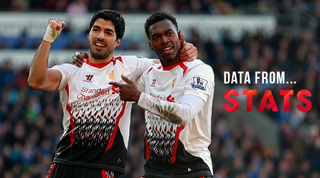Curse of the second-choice Premier League striker: an unwinnable war?
Tactical trends and the death of the super-sub is behind the modern suffering of No.2 strikers, explains Alex Hess
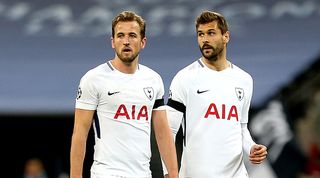
When it comes to impossibly handsome multimillionaire athletes, the natural feeling towards them tends not to be sympathy. Despite that, even the most cold-hearted onlooker might have harboured some pity for Fernando Llorente as Tottenham played Bournemouth last weekend.
The Spaniard has endured a wretched season and barely kicked a ball in recent weeks, but when Harry Kane limped off after half an hour it looked like a rare chance to drum up some confidence. Instead the polar opposite happened: Llorente was ignored in favour of Erik Lamela, Son Heung-min was shoehorned in at centre-forward and, just to stick the boot in, duly scored twice. Llorente, unsummoned from the dugout, was treated to a front-row seat.
Vincent Janssen will know how he feels. As the designated backup to an undroppable fans’ favourite, Llorente’s task is almost entirely thankless. Indeed, Kane has grown so talismanic at Spurs that, when it comes to his rival strikers, he seems able to turn a good player into a dreadful one. Call it the Drogba effect.
Death of a specialist
Yet Llorente’s position is far from unique: he is simply the most extreme example of a booming trend. Look around the Premier League and the paucity of effective stand-in strikers quickly becomes clear.
A role that was once a well-regarded specialism, played with distinction by the likes of David Fairclough, Nwankwo Kanu and Ole Gunnar Solskjaer, has now become a poisoned chalice. Suddenly the subs are not so super.
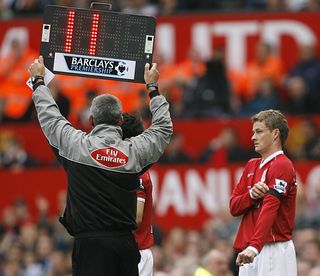
At Liverpool, backup duties to Roberto Firmino have been shared between Daniel Sturridge (before his loan move to West Brom), Dominic Solanke and Danny Ings. Collectively, that trio can count league 21 outings from the bench this season but only a single, meagre goal.
Get FourFourTwo Newsletter
The best features, fun and footballing quizzes, straight to your inbox every week.
Arsenal’s go-to substitute, Danny Welbeck, is yet to score from the bench this term, while his former team-mate Olivier Giroud – admittedly, a highly effective sub in his Gunners days – has merely traded bit-part appearances in north London for bit-part appearances in west London.
Leicester’s Kelechi Iheanacho – a young, explosive penalty-box striker; so in theory, ideal for the job – scored his first league goal for the Foxes last weekend at the 15th attempt. Javier Hernandez, Solskjaer's spiritual heir back in his Old Trafford days, has one in 10 from the bench this term. Even Jermain Defoe, the top-scoring substitute of the Premier League era, hasn't been immune to the epidemic, having netted each of his three goals this season when picked from the start.
A tiny few are keeping the notion alive. Peter Crouch, the Premier League’s eternal Plan B, has scored all three of his league goals for Stoke from the bench. Oumar Niasse’s tally of eight is pretty handy for a player in and out of the Everton side – but they are the exceptions. Clearly there has never been a tougher time to be a second-choice striker.
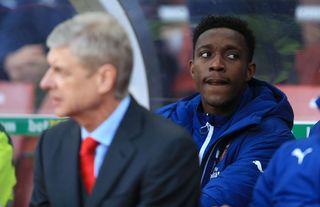
In apparent recognition of this, Jose Mourinho and Roy Hodgson have simply dispensed with the idea altogether, abandoning all pretence of competition for places up top. Their No.9s enjoy a charmed life; even the grimmest of goal droughts are no barrier to their players' residence on the teamsheet. Pep Guardiola has found another way around the issue, brokering a precarious power-sharing agreement between Sergio Aguero and Gabriel Jesus whereby neither player is the obvious support act.
For the most part, though, the division is littered with misfiring stand-ins – and it’s not hard to see why. To succeed in the role means overcoming some stifling contradictions.
You barely ever play, yet you can't afford to look rusty. You must offer something demonstrably different to the other guy, but in a team tailored to his strengths rather than yours. You play in a position where confidence is everything, and yet your status carries an inherently confidence-sapping subtext: you are not as good as him.
You must offer something demonstrably different to the other guy, but in a team tailored to his strengths rather than yours
All of this is exacerbated by the principal tactical shift of recent years, which has seen single-striker systems become the norm. Back when Kanu & Co. were banging them in from the bench, the default was to play two up front. With twice as much game-time to go around, keeping everyone both sharp and happy was far more straightforward. Manchester United’s 1999 treble was famously won with four high-calibre strikers; the Champions League final sealed by goals from the two ostensible backups.
Such luxuries are a thing of the past. While formations have become more fluid, the limits they set their star men are punishingly rigid. Rather than four forwards dividing duties between them, there now tends to be one who monopolises the work and an understudy or two who are left to pray for an injury.
Beleaguered on the bench
The one-up-top blueprint has elevated the sport’s elite forwards to even greater levels of superstardom – the goal-a-game striker is no longer a fantastical pipe dream – but nor has it been without its casualties. Today’s benches are populated not by ravenous game-changers but rather a fleet of beleaguered backups who’ve been made to look worse than they are.
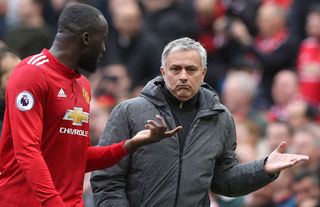
Many have been snaffled by clubs far keener to stockpile strikers than actually play them. In that sense, Llorente and the rest are merely the latest victims of a curse that has struck Rickie Lambert and Wilfried Bony too. Stamford Bridge has become a particular wasteland for backup centre-forwards over the years, be it Mateja Kezman, Claudio Pizarro or Loic Remy.
It’s a dynamic that’s been illustrated in reverse by the soaring fortunes of Michy Batshuayi since he fled Chelsea to seek full-time employment. Transported into a team that not only includes him in it but plays to his strengths too, the man who seemed a blunt instrument during his rare Premier League outings in west London suddenly can’t stop scoring. Sunday’s 94th-minute winner against Eintracht Frankfurt was Batshuayi's seventh in nine games for Borussia Dortmund.
Elsewhere on the continent, Memphis Depay and Edin Dzeko have notched 80 goals between them since relinquishing reserve duties in Manchester for Lyon and Rome respectively.
Put in those terms, it all seems entirely logical. That strikers score more when they play more should be no shock. But the stark gap that has opened up between the stars and their standbys, the slow death of the super-sub, is a very modern phenomenon.
These days, coming off the bench tends to mean gloom rather than glory. Perhaps Llorente should be grateful he didn’t have to muddy his boots.

Thank you for reading 5 articles this month* Join now for unlimited access
Enjoy your first month for just £1 / $1 / €1
*Read 5 free articles per month without a subscription

Join now for unlimited access
Try first month for just £1 / $1 / €1
Most Popular

